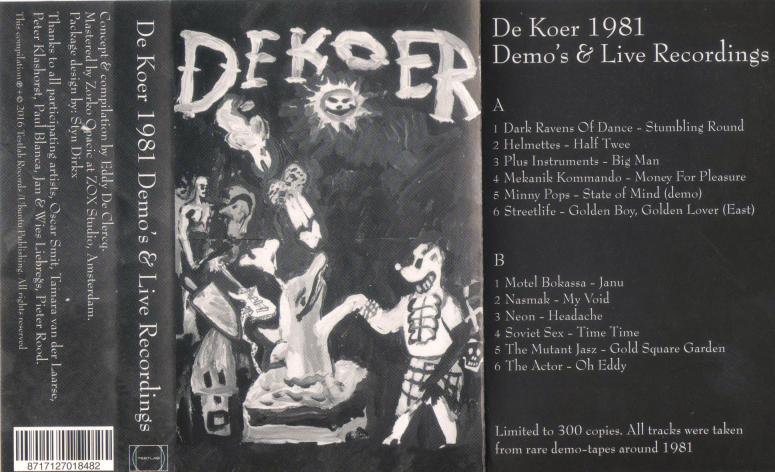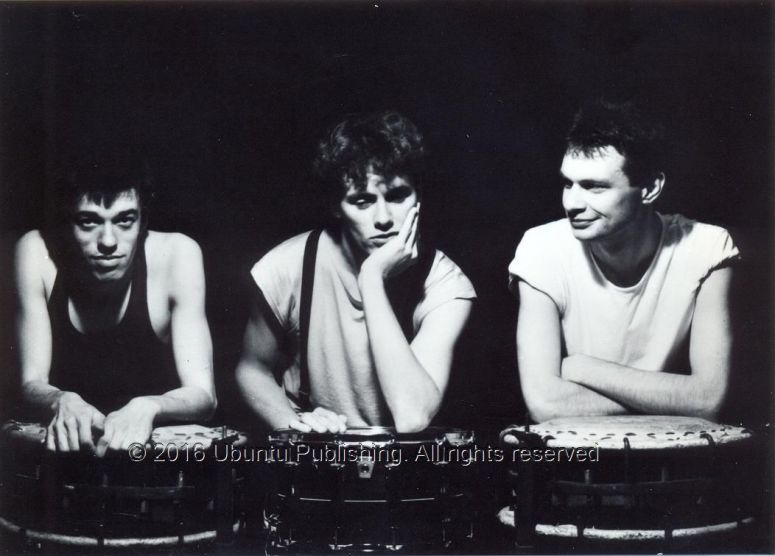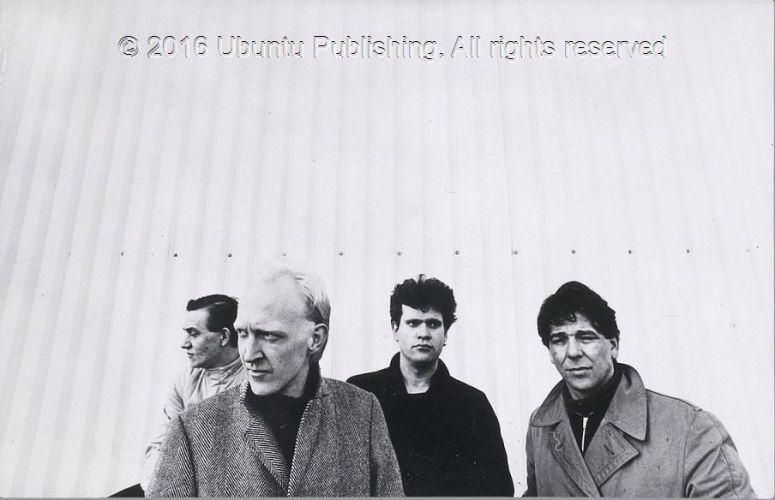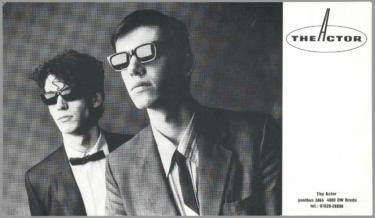eter
All tracks were taken from rare demo-tapes around 1981
limited cassette edition of 300 pcs. Available in selected stores and iTunes from early October 2016
De Koer demos + live recordings 1981
this collection of demos and live recordings from Amsterdam/Dutch post-punk bands capture the early 80s sound and offer a unique insight into the spontaneous, DIY music style of the time
this post is the story of of the bands that are featured on side B of the cassette with a biography and pics …thanks to Oscar Smit and the participating artists. This story reads as a short history -not complete by all means- of the Dutch post-punk/new wave scene…

Motel Bokassa
Motel Bokassa is an intriguing success story with a tragic end for Breda musician Stefan van Campenhout.
After seeing a performance by Japanese percussion group Ondekoza in 1981, Van Campenhout was so inspired that he established the percussion band Motel Bokassa. They started out with five musicians and although the line-up frequently changed, they performed regularly. “We don’t play longer than 45 minutes. Everyone is satisfied after that” said Stefan van Campenhout in Vinyl magazine (March 1982). In 1987 their nameless first album was released and that same year they played at North Sea Jazz. Holger Hiller mixed their second album. In 1992 they took to the stage with a special production for the TegenTonen Festival in Paradiso. Van Campenhout had already made a name for himself with his unique performances and was also composing music for dance acts such as Le Grand Cru.
In 1995 Stefan went on holiday to Switzerland. He didn’t return after a mountain hike and despite search efforts by the authorities and his Dutch friends, he hasn’t been seen since.
The track ‘Janu’ can be found in a slightly different form on the 1989 CD ‘Motel Bokassa’, the cover of which depicts a doom-laden mountain range!

Nasmak
They started out in 1978 singing in their native language, under the name Nasmaak. Shortly after, the band from Nuenen in Brabant changed this to Nasmak and became one of the most important bands in the Ultra era. From 1980 onwards, all their records were released on the Amsterdam based Plurex label, owned by Wally van Middendorp (Minny Pops). Their album ‘4our Clicks’ (1982) was highly praised, not just for the music but also the cover artwork, designed by Rob van Middendorp. In 2008 this album reached, rightly so, the 14th place in the Top 50 all-time best Nederpop charts. In 1984 they performed at the first edition of the TegenTonen Festival in the Paradiso but shortly after the band dissolved.
In 1981 and ’82 a series of experimental cassettes appeared on Plurex called ‘Indecent Exposure’ and one of these featured the original version of ‘(My) Void’, which can be found on the De Koer cassette.

Neon
During the latter part of 1979 a group of high school students got together. Singer Adri Schrover was doing blues covers and drummer San Graafsma dabbled in symphonic rock but they wanted to produce a more exciting type of music and so the New Wave band Neon was born. A school party in 1980 was to be their first performance, where they used a PA system borrowed from friends Nasmak. A couple of Nasmak band members in the audience were so enthusiastic that they immediately invited Neon to be their support act in Dynamo (Eindhoven) the next day. This really started the ball rolling and soon after they featured on the VPRO radio show Oorkussen and were support act for Echo and the Bunnymen during their Dutch tour. On the 13th of August 1980 they played to a sold out Paradiso as support act for The Simple Minds. Like every band in the 80’s, Neon sent demo cassettes to venues and record labels. Torso Records were suitably impressed and in 1981 consequently released the 5 track 12 inch ‘A Day The Land Of Lost Horizons’ (Sublabel/Torso) which was to be the only record Neon ever published. They disbanded in 1982, followed by two attempted revivals, the first group called Dear Henry and the second Les Miserables, in 1985. After this failure, singer Adri Schrover enrolled in the film academy.
Neon also performed at De Koer, a gig arranged by their ‘agent’ Fred Berkhout (who later became label manager at Boudisque) He played Neon’s initial demo tape to Eddy de Clercq that featured the unreleased track ‘Headache’. Adri Schrover recalls “There was no stage so we had to stand on the dance floor while our music played through the speakers and were only allowed to do a short performance: three numbers”.

Soviet Sex
Amsterdam band Soviet Sex roots are based in the Rietveld Academy. This band of artists sprung forth out the ‘Interior’ formation and was the brainchild of Peter Klashorst plus brothers Maarten (1958-2004) and Rogier van de Ploeg. Soviet Sex originally existed for three years. The band members were involved in other projects as well as making music. For a short while they had their own club on the Rozengracht called Disco Bizar, they made (pirate) television, such as PKP TV, and painted. Peter Klashorst is responsible for the De Koer cassette artwork, a piece originally made for Eddy de Clercq.
Soviet Sex did perform at De Koer but their set wasn’t recorded although a video registration of this concert exists. A concert in De Melkweg on the 4th of June 1981 was taped live, and on the track ‘Time, Time’ it can be clearly heard that they used a rhythm box instead of a drummer. In 1982 Maarten and Rogier van de Ploeg started the group Blue Murder that subsequently gave birth to the band Astral Bodies in 1988.
Soviet Sex was briefly resurrected in 1996 and featured the eye-catching singer Ellen ten Damme.

The Mutant Jasz
In 1981 a bunch of musicians from Hoofddorp and Amsterdam decided to form a band. Guitarist Mick Ness and synthesizer player Berlitz hailed from Amsterdam. Mick’s girlfriend Murielle Vuursteen, was the singer and two of her friends, bass player Roel Kruize (who later became label manager at Boudisque) and drummer René Bosch completed the line-up. There were a few rehearsals and a couple of gigs but after about 6 months contact between the members slowly disintegrated and so did the band.
The Mutant Jasz never released any music but they did send a demo tape to De Koer. Among the tracks on that cassette was ‘Gold Square Garden’ produced by Dirk Polak who, together with his cousin Andre Mesman, created the band’s logo

The Actor
The 1980’s were THE decade of the cassette tape. Alongside the record industry, there existed a broad network of small cassette labels that issued a limited amount of music.
Vinyl magazine, VPRO Radio and a few cassette shops, like Staalplaat provided a vital source of support for this network. De Koer was definitely a fervent user of cassette music, and the regular ‘de Zelfkant van de Cassette’ nights, where everyone/anyone could play their own mix tapes. Important cassette labels from that time were Lebel Period, Kubus, Fetisj and Trumpet Tapes to which The Actor, a duo from Breda, were signed to.
Marcel Reimer and Sander Horsthuis knew each other from the art academy and decided to make ‘easy on the ear’ synthipop. They employed Griselda Visser as manager and produced two cassettes full of accessible tunes. Marcel Reimer was working as a designer at Vinyl at this time and he created sleek, classy artwork for the tapes. These sold well and The Actor were spotted by a large recording company: Mercury. In 1985 they re-recorded a track called ‘Cover Girl’ but sadly it flopped.
The song ‘Oh Eddy’ is a solo project by Marcel Reimer and was originally intended as a birthday gift for Eddy de Clercq

Thanks to all participating artists, Oscar Smit, Ronnie Kroese, Tamara van der Laarse, Peter Klashorst, Paul Blanca, Jan & Wies Liebregs, Pieter Rood.
De Koer demos + live recordings 1981 – Testlab 2016.001 CS
This compilation ℗ + © 2016 Testlab Records /Ubuntu Publishing. All rights reserved
Marketed by Ubuntu Publishing.
Distributed by Rush Hour-Amsterdam
Limited to 300 copies.

Een kleine correctie m.b. Motel Bokassa: Stefan ging in 1993 naar Zwitserland, niet in 1995. Pas je het aan? Dank.
Groet,
Laura (zus v. Stefan)
LikeLike